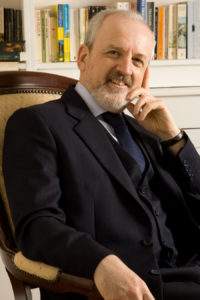
Over the last few years, magic on UK TV has become very polarised. Whereas in the second half of the last millennium magic on the box seemed to be restricted mainly to shows or series featuring individual magicians (David Nixon, Tommy Cooper, Paul Daniels, David Copperfield, David Blaine, Wayne Dobson amongst others), now a whole succession of wannabe stars are simply funnelled into either Britain’s Got Talent (BGT) or Penn and Teller: Fool Us (FU).
The advantage of the TV magic model in the last century for those who actually made it, was that they were able to dominate and for a time become the de facto television magician. The trouble was, there was little or no time on the TV schedules for many others to make an appearance, and even if they did, this rarely led to anything more than a fleeting moment in the spotlight.
Now in theory, the current formats of FU and BGT do seem to offer a much wider range of magicians the chance to strut their stuff. In the case of BGT, there’s an opportunity for a good performer to appear two or three times over a number of weeks and therefore become a bit more known to the general public nationwide.
Certainly, for any magician getting to the final, the exposure can lead afterwards to some lucrative work perhaps, even if the act doesn’t actually win. In fact there has only ever been one magician winner and that was Richard Jones in 2016, but there have been several magicians claiming 2nd and 3rd places over the years too.
Of course BGT pits magicians against all manner of other types of act, and sometimes novelty can top quality when it comes to the viewers’ votes, and the knockout format of the series inevitably means that some very good performers can be discarded by the jaded judging panel.
FU feels more like a proper magic show. Each magician is given a good amount of air time to perform and the underlying ethos of the show is arranged to help the acts do their best and look good rather than pitting them against other magicians. This feels to me a better balance than BGT where they are constantly looking to find reasons to get rid of acts.
The concept on FU of Penn and Teller apparently trying to work out how the tricks are done and then proving to the performer, usually by way of somewhat coded revelations which seek to protect the actual secrets from the lay audience, is a bit strange, and in many ways it is reducing the performance right down to its method, stripping away all other elements, which is a pity.
However, over the years the accolade of having won the Fool Us award has been used by the recipients to create a validation for them as performers, and it is a prize that is far more recognised and which has far greater importance than any of the cups and trophies awarded within the magic world itself.
It is perhaps a mute point as to how many of those who achieve success in either FU or BGT go on to sustained success, but they do both offer far more acts the chance to show what they can do on mainstream television in a way that just simply wasn’t possible previously.

 One of the most difficult jobs that any commercial performer faces is how to decide what to charge for his performances. There are so many potential factors to take into consideration when setting a satisfactory fee that it’s hardly surprising that people entering into it fresh will probably have no idea where to start.
One of the most difficult jobs that any commercial performer faces is how to decide what to charge for his performances. There are so many potential factors to take into consideration when setting a satisfactory fee that it’s hardly surprising that people entering into it fresh will probably have no idea where to start.